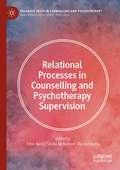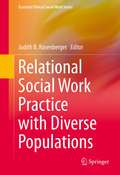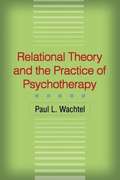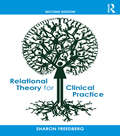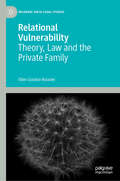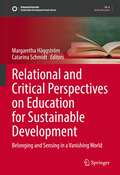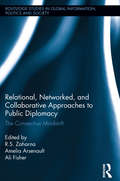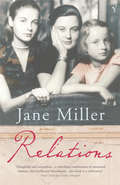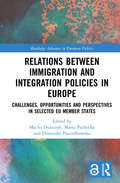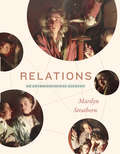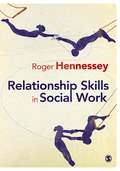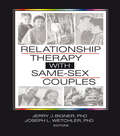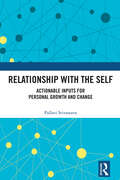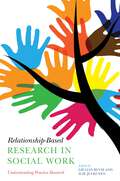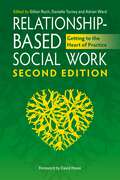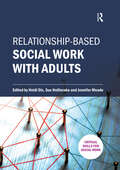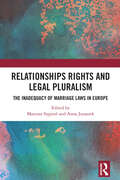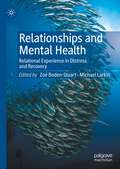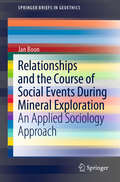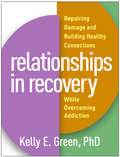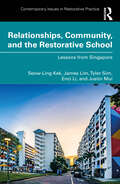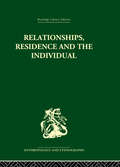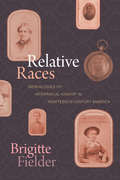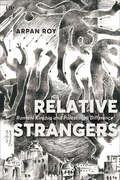- Table View
- List View
Relational Processes in Counselling and Psychotherapy Supervision (Palgrave Texts in Counselling and Psychotherapy)
by Ottar Ness Sheila McNamee Øyvind KvelloThis book is focused on relational processes in supervision for counselling and psychotherapy. The aim is first to introduce a relational theoretical stance, then to apply that stance to the process of supervision, and finally to offer practitioners immediately accessible resources for relational supervision. Within a relational perspective, supervisor and supervisees are viewed as partners who co-construct the supervisory process. Unlike other approaches to supervision where the emphasis is on specific techniques and strategies for supervision, the relational orientation of this book invites supervisor and supervisee into different understandings of the supervisory interaction. This orientation directs our attention to the importance of co-creating the therapeutic relation/alliance with special attention to the wellbeing of the the supervisee and the supervisor. Supervision, from this perspective, is focused on what participants are making together rather than on the individual abilities, strengths, and weaknesses of either the supervisor or the supervisee.
Relational Social Work Practice with Diverse Populations
by Judith B. RosenbergerClinical Social Work Practice with Diverse Populations provides an integrative relational perspective to the understanding and treatment of contemporary diverse populations. Chapters provide rich case examples, offering practice guidelines from engagement to termination and addressing the unique transference-countertransference matrix of each therapeutic dyad. Geared toward student social work practitioners, the relational theory model used in this book integrates skill learning with population-specific knowledge. This relational framework avoids the marginalization of diversity content in practice books, and loss of theoretical depth and consistency in diversity books. Diversity practice is therefore not segregated as a separate subject or skill set, potentially instilling students with confidence about clinical social work practice with diverse populations.
Relational Theory and the Practice of Psychotherapy
by Nancy Mcwilliams Paul WachtelThis important and innovative book explores a new direction in psychoanalytic thought that can expand and deepen clinical practice. Relational psychoanalysis diverges in key ways from the assumptions and practices that have traditionally characterized psychoanalysis. At the same time, it preserves, and even extends, the profound understanding of human experience and psychological conflict that has always been the strength of the psychoanalytic approach. Through probing theoretical analysis and illuminating examples, the book offers new and powerful ways to revitalize clinical practice.
Relational Theory and the Practice of Psychotherapy
by Paul L. WachtelThis important and innovative book explores a new direction in psychoanalytic thought that can expand and deepen clinical practice. Relational psychoanalysis diverges in key ways from the assumptions and practices that have traditionally characterized psychoanalysis. At the same time, it preserves, and even extends, the profound understanding of human experience and psychological conflict that has always been the strength of the psychoanalytic approach. Through probing theoretical analysis and illuminating examples, the book offers new and powerful ways to revitalize clinical practice. See also Wachtel's Therapeutic Communication, Second Edition: Knowing What to Say When, an integrative, practical guide for therapists of all orientations.
Relational Theory for Clinical Practice
by Sharon FreedbergRelational Theory for Clinical Practice offers students and practitioners a conceptual framework for thinking relationally about social work with clients within a biological, psychological, and socio-cultural framework.? Integrating relational theory with the principles of clinical practice, and demonstrating how this can be applied to social work practice, this book has been revised and updated to be suitable for students.? Using plenty of? case material to demonstrate the theory in action, the new edition incorporates teaching points to aid readers in drawing out the practice principles developed in each chapter. Keeping relationships at the center of the text, this edition includes substantially expanded chapters on assessment and intervention, and takes into account recent research on issues such as the impact of trauma and stress; neuroscience and brain research; and the necessity of practicing in a culturally sensitive way with diverse populations.? It broadens the feminist focus of relational-cultural theory by extending and applying it to men also. Designed for use on master's level courses in practice, as well as courses on human behavior and the social environment, this concise and practical book is a valuable text for social work and counseling students.?
Relational Vulnerability: Theory, Law and the Private Family (Palgrave Socio-Legal Studies)
by Ellen Gordon-BouvierThis book breaks new theoretical ground by constructing a framework of ‘relational vulnerability’ through which it analyses the disadvantaged position of those who undertake unpaid caregiving, or ‘dependency-work’, in the context of the private family. Expanding on existing socio-legal scholarship on vulnerability and resilience, it charts how the state seeks to conceal the embodied and temporal reality of vulnerability and dependency within the private family, while promoting an artificial concept of autonomous personhood that exposes dependency-workers work to a range of harms. The book argues that the legal framework governing the married and unmarried family reinforces principles of individualism and rationality, while labelling dependency-work as a private, gendered, and sentimental endeavor, lacking value beyond the family. It also considers how the state can respond to relational vulnerability and foster resilience. It seeks to provide a more comprehensive understanding of resilience, theorising its normative goals and applying these to different hypothetical state responses.
Relational and Critical Perspectives on Education for Sustainable Development: Belonging and Sensing in a Vanishing World (Sustainable Development Goals Series)
by Margaretha Häggström Catarina SchmidtThis volume focuses on the fourth Sustainable Development Goal (SDG), education, to look at sustainability from various angles with the purpose of challenging preconceptions about what sustainable education might entail and how it should be conducted. To this end, the book assembles scholars from various research fields and disciplines, who are willing to be at the cutting edge regarding sustainability and education on all levels with students in the ages of 6-15. Through this approach, the text points towards a “wild pedagogy” in line with post-sustainable thinking. This involves agency and the role of nature itself as a co-educator, and promotes cultural changes, and explorative processes of finding “the wild” – the unknown, and complexity in nature – and thus of challenging the human need for control. This approach is also, in line with the 2030 Agenda, an attempt to move from advocating predetermined behavioural change to embracing a pluralistic perspective on sustainability, based on holistic views on education. Such views include curiosity, wonderment, compassion and agency as guiding lights. The book is structured into three sections, based on three interrelated strands. These strands are, in various ways, dependent on one another and further engaged with bringing education theory and practice together. These strands are 1) Belonging and sensing, 2) Critical thinking, social justice and action competence, and 3) Creating hope in a vanishing world. These strands aim to increase our access to and understanding of the ways in which sustainability can be integrated into education and why. The purpose of the text is to encourage educators of all kinds and levels, as well as scholars in different fields, to explore new perspectives on education for sustainable development. The book examines probes in diverse academic fields and focuses on how to combine different approaches and content, and therefore everyone interested in interdisciplinary and cross-curricular teaching and learning should find this work enlightening.
Relational, Networked and Collaborative Approaches to Public Diplomacy: The Connective Mindshift (Routledge Studies in Global Information, Politics and Society)
by Ali Fisher R. S. Zaharna Amelia ArsenaultOver the past decade, scholars, practitioners, and leading diplomats have forcefully argued for the need to move beyond one-way, mass-media-driven campaigns and develop more relational strategies. In the coming years, as the range of public diplomacy actors grows, the issues become more complexly intertwined, and the use of social media proliferates, the focus on relations will intensify along with the demands for more sophisticated strategies. These changes in the international arena call for a connective mindshift: a shift from information control and dominance to skilled relationship management. Leading international scholars and practitioners embark on a forward-looking exploration of creative conceptual frameworks, training methods, and case studies that advance relational, networking, and collaborative strategies in public diplomacy. Light on academic jargon and rich in analysis, this volume argues that while relationships have always been pivotal to the practice of public diplomacy, the relational dynamics are changing. Rather than focus on specific definitions, the contributors focus on the dynamic interplay of influence in the public diplomacy environment. That environment includes state and non-state actors, public and private partners, competitors and collaborators, new and old media, and is conditioned by power, ethics, and cultures. This book is an essential resource to students and practitioners interested on how to build relationships and transform them into more elaborate network structures through public communication. It will challenge you to push the boundaries of what you think are the mechanisms, benefits, and potential issues raised by a relational approach to public diplomacy
Relations
by Jane MillerIn this remarkable book, Jane Miller writes about the experience of being a daughter and a sister, about the intensities of family life and the illuminations that come from the last days of parents. Relations describes a record-keeping kinship and offers portraits of her parents' long marriage, its mysteries and incompatibilities, of her grandfather, the scientist Redcliffe Salaman, and of her great-aunt Clara Collet, one of the first women civil servants. It is a story in which Karl Marx and George Gissing have parts to play.Here are the tensions of belonging and yet not belonging to an English middle-class at once hospitable to difference and internally divided. More than two hundred years of English history are present in these portraits, which show the dawning emancipation of women and the effects of empire on family life. It is the story of an evolution, of a move out of trade towards public service and the professions, and towards the dramas and family romance of recent times.
Relations between Immigration and Integration Policies in Europe: Challenges, Opportunities and Perspectives in Selected EU Member States (Routledge Advances in European Politics)
by Maciej Duszczyk Marta Pachocka Dominika Pszczó 322 KowskaWritten from a pan-European perspective, this book examines the decision-making processes in immigration and integration policies in Europe across decades, focusing on several key moments of Europe’s postwar history. The analysis of factors taken into consideration by states in key moments of immigration policy (re)formulation shows that Europe is moving away from rational, economic arguments towards more political ones. This book contributes to the theoretical and practical debate regarding immigration and integration policies by arguing that – contrary to assumptions – immigration policy should not be treated as having precedence before integration policy. It also reflects on the growing anti-immigration sentiments as well as the securitisation and criminalisation of migration issues that are fuelled by right-wing politics. This book will be of key interest both to students and scholars of migration, the European Union, European integration, social policy, public policy, international relations, European studies, law, economics, sociology and to professionals, policy-makers, think tanks and associations in NGOs, the EU and other IOs. The Open Access version of this book, available at: https://www.taylorfrancis.com/books/e/9780429263736, has been made available under a Creative Commons Attribution-Non Commercial-No Derivatives 4.0 license.
Relations: An Anthropological Account (Pamphlets Ser. #No. 6)
by Marilyn StrathernThe concept of relation holds a privileged place in how anthropologists think and write about the social and cultural lives they study. In Relations, eminent anthropologist Marilyn Strathern provides a critical account of this key concept and its usage and significance in the English-speaking world. Exploring relation's changing articulations and meanings over the past three centuries, Strathern shows how the historical idiosyncrasy of using an epistemological term for kinspersons (“relatives”) was bound up with evolving ideas about knowledge-making and kin-making. She draws on philosophical debates about relation—such as Leibniz's reaction to Locke—and what became its definitive place in anthropological exposition, elucidating the underlying assumptions and conventions of its use. She also calls for scholars in anthropology and beyond to take up the limitations of Western relational thinking, especially against the background of present ecological crises and interest in multispecies relations. In weaving together analyses of kin-making and knowledge-making, Strathern opens up new ways of thinking about the contours of epistemic and relational possibilities while questioning the limits and potential of ethnographic methods.
Relationship Skills in Social Work
by Roger Hennessey"Roger Hennessey has written a wonderfully warm and readable book about the importance of a relationship-based approach to social work practice. It is full of wisdom, humanity, and commonsense. The book is rich with examples and exercises. You know that you are in the hands of an expert whose skill, experience and understanding shine and reassure on every page." Professor David Howe, School of Social work and Psychology, University of East Anglia Human relationships lie at the very heart of social work practice, and an understanding of their importance is a crucial aspect of training. This book considers the place of relationships in current practice and explores the ways in which social workers can use relationship skills to achieve the best possible outcomes for their clients. The book also offers a unique discussion of the social worker′s relationship with him or herself, arguing that self-awareness is as essential to good practice as an emotional understanding of the other. In doing so, the book promotes a new model for relationship-based social work, which emphasises the importance of both the inter- and intrapersonal. Opening with an introduction to the theoretical bases of the relationship-based model, the book then focuses on their direct application to social work practice. Key topics include: -Self-awareness and using oneself -Knowing the other person -Sustaining oneself -The ethics of relationship-based social work -Internalising knowledge, skills and values Using reflective exercises and case studies, the book encourages students to relate the tools they have learnt to practice scenarios from the real world, and is essential reading for all qualifying social work students.
Relationship Therapy with Same-Sex Couples
by Joseph L. Wetchler Jerry BignerUse new knowledge of the LGBT culture to ably counsel same-sex couples! Relationship Therapy with Same-Sex Couples provides psychologists, therapists, social workers, and counselors with an overview of the array of treatment issues they may face when working with couples from the LGBT community. This book highlights the experiences of therapists who have encountered concerns particular to LGBT clients-especially those in intimate relationships. This intriguing resource covers clinical issues, sex therapy, special situations, and training issues for helping therapists successfully counsel same-sex couples. Relationship Therapy with Same-Sex Couples explores the therapist&’s role in working through universal issues in couples therapy-such as communication problems, infidelity, and decision-making-with a focus on how therapy should differ for same-sex couples. This important guide also identifies which problems are unique to couples as an aspect of their sexual orientation, including gender role socialization and societal oppression. With this book, you will be able provide appropriate therapy without over- or under-attributing a couple&’s problems to their LGBT status. This book shows how experienced therapists have developed methods for working with: gay and lesbian parents heterosexual spouses and ex-spouses couples in HIV serodiscordant relationships "lesbian bed death" couple and family dynamics supporting transgender and sexual reassignment issues and more! Relationship Therapy with Same-Sex Couples contains several features for you to utilize in your own practice, including the Sexual Orientation Matrix for Supervision (SOMS) to assist supervisors and trainers in preparing supervisees to work with lesbian, gay, and bisexual clients. The book also offers guidelines for heterosexual therapists who plan to work with same-sex couples and how to overcome any residual homophobia or heterosexual guilt. Lastly, this essential sourcebook reviews several articles, book chapters, books, and Web sites that are relevant to same-sex couples and the therapists who work with them.
Relationship with the Self: Actionable Inputs for Personal Growth and Change
by Pallavi SrivastavaThis book delves into the various aspects of a person’s relationship with their inner selves and the impact this crucial relationship can have on their well-being. It offers insights, tools, and practices to understand and nurture this relationship focusing not only on the ‘what’ but also on the ‘how’ of it. Designed to be a self-help guide, this book takes readers on an exciting journey into their inner worlds and dives into the various voices within a person. Drawing from the fields of psychology, coaching, and mindfulness, the book breaks down complex ideas like acceptance, authenticity, and selfcompassion into actionable steps.The book will be indispensable for readers interested in improving well-being and enhancing personal development skills. It will also be useful for students and researchers of positive psychology and behavioral psychology and mental health and wellness rofessionals including therapists, counsellors, and executive coaches.
Relationship-Based Research in Social Work: Understanding Practice Research
by Irwin Epstein Gillian Ruch Outi Jaakkola Elina Virokannas Gavin Swann Laura Yliruka Erja Saurama Harry Lunabba Katarina Fagerström Kathleen Russell Helen Hingley-Jones Jonna Vanhanen Ilse JulkunenRelationship-based research is founded on the idea that human relationships are of paramount importance and should be central to social work research and practice. Drawing on psychodynamic and systemic understandings of research and practice, this book offers practitioners and academics an insight into what constitutes relationship-based approaches to research. These ideas are brought to life by illustrative case studies of research projects carried out in England and Finland, where the concept originated. The authors clearly demonstrate how this approach can be applied across the social work sector and provide a model for practice. This will be a key reference for social work students, practitioners on post-qualifying courses, research students, and consultant and senior practitioner social workers promoting research-informed practice.
Relationship-Based Social Work, Second Edition: Getting To The Heart Of Practice
by Martin Smith David Howe Gillian Ruch Jane Dutton Danielle Turney Adrian Ward Andrew Cooper John Simmonds Ravi Kohli Clare Parkinson Robin Solomon Linnet McMahon Anna Fairtlough Jeremy WalshThis comprehensive guide to relationship-based practice in social work communicates the theory using illustrative case studies and offers a model for practice. Updated and expanded, it now includes increased coverage of anti-oppressive and diversity issues, service user perspectives and systemic approaches in social work. The book explores the ranges of emotions that practitioners may encounter with service users, and covers working in both short-term and long-term professional relationships. It also outlines key skills, such as how to establish rapport, and explores systemic issues, such as building appropriate support systems for practice, management and leadership.
Relationship-based Social Work with Adults
by Heidi Dix Sue Hollinrake Jennifer MeadeThere has been a resurgent interest in relationship-based practice and the Care Act 2014 recognises the significance of effective working relationships with service users and carers to ensure a person-centred approach and effective participation and co-production. The Care Act advocates a strengths-based, whole family approach to assessment, care and support planning. Relationship, putting the person at the centre of the process, lies at the heart of this approach.This book is a practice-based exploration of relationship-based practice for social work with adults that looks at underpinning theory, legislation and policy drivers, value perspectives and skills in practice. The first part of the book introduces relationship-based practice and theoretical concepts, such as psycho-social and psycho-dynamically informed approaches to practice which highlight the complexities of relationships, at conscious and unconscious levels, both from the service user/carer perspective and the professional's perspective, where reflection and use of self are key; it critically explores the legislation and policy context. A conceptual model called IDEAS is introduced which provides a framework for the second part of the book, by breaking down the discussion into relevant practice issues. Here theory, skills and values are applied through case examples to illustrate the efficacy of relationship-based practice across a range of practice settings in social work with adult service users and carers.
Relationships Rights and Legal Pluralism: The Inadequacy of Marriage Laws in Europe
by Mateusz Stępień Anna JuzaszekThis interdisciplinary book brings together leading social and legal scholars to tackle the incompatibility of marriage laws with contemporary social reality in Europe. Their critique is based on the assumption that individuals should be able to choose how they organise their close relationships. The contributors emphasise the importance of pluralism of beliefs, values, cultures, and lifestyles and the consequent need for legal recognition to make individuals' private choices valid and respected. The first part of the book establishes the foundation for the subsequent chapters by exploring the advantages and challenges of focusing on values while accommodating relationship design plurality, the impact of the European Court of Human Rights on the issue, and the transformation of the institution of marriage. The second part presents different legal responses to non-state marriages, particularly religious marriages among Muslim communities, and proposals for reform. The third part of the book features empirical research on the marital experiences of two communities: Muslims and migrants. The chapters concentrate on polygyny among female converts to Islam, the importance of religious knowledge for practising Muslim women in securing rights in their marital relationships, transnational and interreligious marriages, and the impact of acculturative orientation and position in the dual labour market on the choice of life partner among Polish migrant women. The book will be of interest to academics, researchers, and policymakers working in the areas of human rights law, family law, legal anthropology, law and religion, socio-legal studies, feminism and queer studies, and sociology of family.
Relationships and Mental Health: Relational Experience in Distress and Recovery
by Michael Larkin Zoë Boden-StuartThis interdisciplinary edited volume examines the complexities of relational life in the context of psychological distress and recovery. It is well documented that supportive, close relationships are central to wellbeing. This volume explores how connectedness is shaped by mental health settings, interventions and mental health experiences - and vice versa. In doing so, this work provides important insights for adult mental health care, where systems and settings can often struggle to take account of the relational context of distress and recovery. This is the first book to address the emerging shift towards a relational account of distress and recovery through a focus on people's experiences. Chapters explore community and statutory service settings, privileging the voices of those experiencing distress, their loved ones and the professionals who work with them. It also extends recent interest in the role of loneliness and social isolation in mental health, to consider themes such as belonging, connection, care and intimacy. It will appeal to mental health practitioners as well as academics in the fields of psychology, sociology, psychotherapy, psychiatry, social policy and social work.
Relationships and the Course of Social Events During Mineral Exploration: An Applied Sociology Approach (SpringerBriefs in Geoethics)
by Jan BoonThis book provides the results of nine case studies of the course of social events in mineral exploration projects (mostly in Latin America). The author concluded that, while each case is sui generis, the underlying sociological processes are the same. This made it possible to develop a generalized model for the course of social events during mineral exploration. It consists of seven stages: (i) arrival of the project; (ii) initial meanings, interpretations and decisions; (iii) real dialogue; (iv) building relationships; (v) change processes; (vi) new relationships and social structures and (vii) the course of social events and perceived benefits and harms. Stages (iii) => (iv) => (v) => (iii) form a continuous iterative cycle. Dialogue and relationships are at the heart of the model. The text describes five of the nine case studies in some detail and illustrates how sociology explains the sociological processes in these projects. These examples, together with the final chapter that discusses the implications, provide many practical pointers for all actors involved: industry, communities, NGOs, home governments and host governments.
Relationships in Recovery: Repairing Damage and Building Healthy Connections While Overcoming Addiction
by Kelly E. GreenOne of the most devastating aspects of addiction is the damage it causes to relationships--with intimate partners, family, friends, or colleagues. But recovery programs often recommend that you focus solely on sobriety and don&’t emphasize the need to rebuild relationships. Psychologist and addictions expert Kelly Green wants to change that. Through her work with hundreds of clients, Dr. Green has learned that social support is key to the recovery process. This compassionate, judgment-free guide shares powerful tools you can use to recognize the differences between healthy and unhealthy relationships, set and maintain boundaries, reestablish emotional intimacy, communicate your feelings and needs, and end harmful relationships respectfully. With inspiring stories and easy-to-use worksheets (you can download and print additional copies as needed), this book lights the way to a life untethered from addiction--and filled with positive connections
Relationships, Community, and the Restorative School: Lessons from Singapore (Contemporary Issues in Restorative Practices)
by James Lim Tyler Sim Enci Li Justin Mui Seow-Ling KekThis book shares our journey with restorative practice and provides insight into how we developed a programme that impacts school culture – the Builders Project. It is a documentation of our experience of bringing restorative practice to primary school settings in Singapore, through a whole-school community building approach, to enable students to have a positive learning experience and to thrive. This contrasts with implementing restorative practice focusing on behavioural management. It is the first non-Western contribution to the field of restorative practices as a whole-school approach.This book shares Lutheran Community Care Services (LCCS) practice assumptions that underpin the need to build, strengthen, and restore relationships. It also illustrates the application of our restorative practice principles, which are drawn from our experience, values, and research, towards building effective relationships among the individuals in the school community. Stories and perspectives of practitioners, students, parents, teachers, and school leaders are shared to highlight how they experience voice, agency, and belonging through restorative processes. Most importantly, we hope that this book will inspire you to reflect on your journey with restorative practice in schools through the reflection questions posed in each of the substantive chapters.This book is for educators, school social work and mental health practitioners, educational policymakers, school administrators, principals, academics, researchers, and restorative practice practitioners. This book is also suitable for undergraduates or postgraduate students who desire to understand practice beyond the theories that they have learnt and gain insights on what the journey of practicing and implementing restorative practice looks like.
Relationships, Residence and the Individual: A Rural Panamanian Community (Routledge Library Editions)
by Stephen GudemanRepresenting a departure from traditional studies of social organisation, the book asserts that a kinship system is best understood as a system of concepts rather than as a set of empirical relationships. Three aspects of life in the Panamanian community of Los Boquerones are described First published in 1976.
Relative Races: Genealogies of Interracial Kinship in Nineteenth-Century America
by Brigitte FielderIn Relative Races, Brigitte Fielder presents an alternative theory of how race is ascribed. Contrary to notions of genealogies by which race is transmitted from parents to children, the examples Fielder discusses from nineteenth-century literature, history, and popular culture show how race can follow other directions: Desdemona becomes less than fully white when she is smudged with Othello's blackface, a white woman becomes Native American when she is adopted by a Seneca family, and a mixed-race baby casts doubt on the whiteness of his mother. Fielder shows that the genealogies of race are especially visible in the racialization of white women, whose whiteness often depends on their ability to reproduce white family and white supremacy. Using black feminist and queer theories, Fielder presents readings of personal narratives, novels, plays, stories, poems, and images to illustrate how interracial kinship follows non-heteronormative, non-biological, and non-patrilineal models of inheritance in nineteenth-century literary culture.
Relative Strangers: Romani Kinship and Palestinian Difference (Anthropological Horizons)
by Arpan RoyExamining how memory, intergenerational transmission, and kinship work together, Relative Strangers sheds light on Romani life in Palestine. Arpan Roy presents an ethnographic portrait of Dom Romani communities living between Palestine and Jordan, zooming in on everyday life in working-class neighborhoods, and under conditions of perpetual war and instability. The book focuses on how Doms are able to sustain ethnic difference through kinship, even when public performances of difference are no longer emphasized – a kind of alterity that is neither visible by obvious markers like race or religious difference, nor detected by the antennas of the state. Drawing on long-term ethnographic fieldwork in Jerusalem, Ramallah, and Amman, Roy makes a case for such alterity for Romani people and other groups in the region. Analysing intimate ethnographic scenes through anthropological theories of kinship, psychoanalysis, social theory from the Global South, and more, the book reveals how alterity in the Middle East does not adhere to rigid identitarian categories. Ultimately, Relative Strangers demonstrates the inadequacy of transposing models of pluralism centred on European and American experiences of minoritization onto other contexts.
